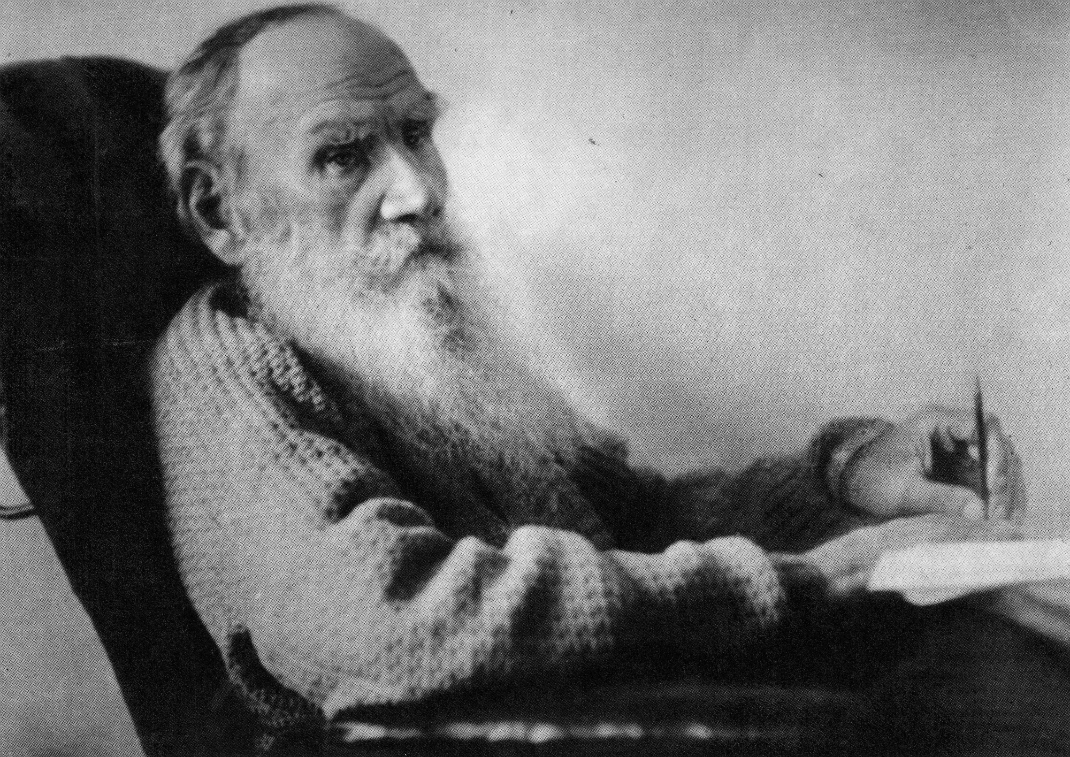Known for his critically acclaimed novels Anna Karenina, War and Peace, and The Death of Ivan Illyich, Leo Tolstoy is considered on of the world’s greatest authors.

Leo Tolstoy was born on his family’s estate, Yasnaya Polyana on September 9th, 1828. Yasnaya Polyana was located in the Tula Province in Russia. Only a couple years after Leo was born, his mother passed away in 1830. After her death, Leo’s father’s cousin began taking care of the four boys. Leo’s father, Count Nikolay Tolstoy, died only seven years after his wife’s death. It seemed that death followed the Tolstoy family closely, after Leo’s aunt became the children’s primary guardian she unfortunately passed away as well. This death forced the children to move to Kazan Russia to live with another aunt. These experiences resonated with the young Leo, and many believe that his continuous loss inspired him to idolize childhood in many of his writings.
While Leo gained most of his education from home, he enrolled at the University of Kazan in 1843 to study Oriental languages. Leo struggled as a student, receiving low grades from many of his teachers. He was eventually forced to transfer to a different program. Tolstoy finally left the University without graduating and returned home in 1847. In an attempt to find a new career, Leo began farming. He began managing serfs and farmhands, but ultimately failed as farmer because of his frequent visits to Moscow. The one constant in Leo’s life at the time was his ability to keep track of his daily struggles in a journal. Leo journaled his entire life, and eventually his musings inspired many of his fictional pieces.
As Leo’s career attempts continued to fail, his brother Nikolay convinced Leo to join the army. So Leo joined as a junker and began his service in Sevastopol, Ukraine in 1854. A year later, Leo began to fight in Crimean War.
During his time in the army, Leo began working on an autobiographical story titled Childhood. When Tolstoy finished this piece he submitted it to the magazine called The Contemporary. Childhood was Tolstoy’s first published piece. He continued to write, despite battling during the Crimean War. He began working on another piece titled, Boyhood, which would become the second book in an autobiographical trilogy. Leo left the army as soon as the Crimean War ended and returned home. Tolstoy spent a few years gambling away his money, but finally married in 1862. Leo married Sofya Andreyevna Bers in the same year that he also published a piece titled Yasnaya Polyana.
A year after the couple was married, Sofya gave birth to their first child in June. Sofya would eventually give birth to 12 more children. During this time, Leo’s creativity flourished and in 1865 he published the first installment of War and Peace which was titled The Year 1805. Every installment of War and Peace was published in Russian Messenger. The novel was finally finished a year later. War and Peace was extremely popular among the public and critics.
With the success of War and Peace, Tolstoy began working on Anna Karenina. This novel was also published in small installments from the years 1873 to 1877. Just like War and Peace, Anna Karenina gained a lot of popularity among the critics and the public.
During the later years of Leo’s, life he began to explore religious and moral ideas. Tolstoy began to attend various churches, but decided that organized religion was corrupt. However, this didn’t stop Tolstoy from being a religious man. He developed his own beliefs and began to establish himself as a religious leader. This change put a lot of strain on his marriage because his wife did not agree with his teachings. As tensions grew, Leo and his daughter Aleksandra decided to leave the comfort of their own home on a pilgrimage. Leo and Aleksandra left in October 1910, but kept their travel a secret to avoid any encounters with the press.
The pilgrimage was a rough journey for the aging author. A month after their departure, a stationmaster in Astapovo, Russia welcomed Tolstoy into his home to gain back his strength. Unfortunately, Leo never got back on the road to resume his pilgrimage. Leo Tolstoy died on November 20th, 1910 in the station-masters’ home. His family buried him at the Yasnaya Polyana estate where the rest of his family is buried.
Leo Tolstoy lived a long and fulfilling life. Despite losing so many that he loved, he used these experiences to create many beautiful and inspirational works. War and Peace is still considered one of the greatest novels to be written. This novel and many others are continued to be studied and loved by many.